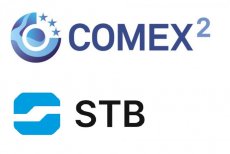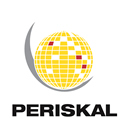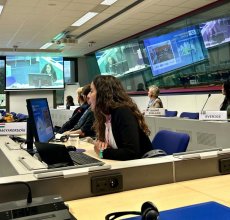|
|
|
|
|
Društvo je upisano u registar Trgovačkog suda u Zagrebu pod brojem Tt-08/7797-2
MBS: 080661952
MB: 2396475
OIB: 51551401153
Poslovna banka:
Privredna banka d.d.
Račkoga 6, 10 000 Zagreb
Broj žiro-računa: 2340009-1110343004
IBAN: HR23 2340 0091 1103 4300 4
BIC: PBZGHR2x
Temeljni kapital Društva iznosi 20.000,00 kuna i uplaćen je u cijelosti.
Uprava društva: Ranka Grubešić Obad, Damir Obad
Direktor: Ranka Grubešić Obad, Damir Obad
Registered with the Commercial Court in Zagreb under the registration number Tt-08/7797-2. Bank info: Privredna banka d.d., Radnička cesta 50, 10000 Zagreb Investment capital: 1.020.000,00 HRK |
|
|
|
|
hr en |

 Lock Management System
Lock Management System FAIRway Danube II – Procurement of Equipment for Inland Waterway Marking
FAIRway Danube II – Procurement of Equipment for Inland Waterway Marking Upgrade of the VTMIS System
Upgrade of the VTMIS System FRED - Fire Free MED
FRED - Fire Free MED Development and Integration of Passenger Cabin Navigation Module for RPIS
Development and Integration of Passenger Cabin Navigation Module for RPIS National Crew Database (NCDB) – Implementation of International Crew Data Management System
National Crew Database (NCDB) – Implementation of International Crew Data Management System Upgrade of Czech AIS central system
Upgrade of Czech AIS central system Supply and installation of hardware and software for Czech radio VHF control and command system on Laba and Vltava rivers
Supply and installation of hardware and software for Czech radio VHF control and command system on Laba and Vltava rivers Supply and installation of hardware for Czech AIS system on Laba and Vltava rivers
Supply and installation of hardware for Czech AIS system on Laba and Vltava rivers Provision of project management services and technical assistance within the RIS COMEX project
Provision of project management services and technical assistance within the RIS COMEX project DAPhNE project
DAPhNE project EcoSUSTAIN project
EcoSUSTAIN project Technical assistance and supervision for installation of equipment and integration of navigation monitoring system on the Danube River
Technical assistance and supervision for installation of equipment and integration of navigation monitoring system on the Danube River RIS implementation on Sava waterway
RIS implementation on Sava waterway RIS system development in the Czech Republic
RIS system development in the Czech Republic CroRIS system maintenance
CroRIS system maintenance Studies in the framework of the IRIS Europe III project
Studies in the framework of the IRIS Europe III project Action plan for development of Inland waterway shipping in Croatia
Action plan for development of Inland waterway shipping in Croatia Pilot Implementation of RIS on the Lower Odra River, Poland
Pilot Implementation of RIS on the Lower Odra River, Poland Technical assistance for Reconstruction of the Port of Vukovar – New port East
Technical assistance for Reconstruction of the Port of Vukovar – New port East Technical Assistance for rehabilitation and improvement of the Sava River waterway
Technical Assistance for rehabilitation and improvement of the Sava River waterway NEWADA duo
NEWADA duo Technical Assistance for Master Plan of the Sisak New Port
Technical Assistance for Master Plan of the Sisak New Port RIS Implementation in Serbia
RIS Implementation in Serbia  Feasibility Study of the PannonRIS Upgrade
Feasibility Study of the PannonRIS Upgrade CoPo Project
CoPo Project Upgrade of Slovak AIS system
Upgrade of Slovak AIS system Lock Management System implementation at the Đerdap lock within the scope of the RIS Serbia project
Lock Management System implementation at the Đerdap lock within the scope of the RIS Serbia project Installation, configuration and integration of a RIS subsystem on a BLADE chassis of the Serbian RIS central segment
Installation, configuration and integration of a RIS subsystem on a BLADE chassis of the Serbian RIS central segment Detailed specification design and development of the ERI subsystem within the framework of the RIS implementation project in the Republic of Serbia
Detailed specification design and development of the ERI subsystem within the framework of the RIS implementation project in the Republic of Serbia Software for the VoIP voice signal transfer, busy signal transfer and channel control of transmitters via microwave and satellite Ethernet communication
Software for the VoIP voice signal transfer, busy signal transfer and channel control of transmitters via microwave and satellite Ethernet communication
 Software Development
Software Development  Hardware Development
Hardware Development Project Management and Consulting
Project Management and Consulting
 Periskal Group
Periskal Group KIOS
KIOS iC consulenten Ziviltechniker GmbH
iC consulenten Ziviltechniker GmbH TINA International GmbH
TINA International GmbH VUD
VUD Ministry of the Interior - Republic of Croatia
Ministry of the Interior - Republic of Croatia Novofer Zrt.
Novofer Zrt. Komteh
Komteh National Association of Radio Distress-Signalling and Infocommunications - RSOE
National Association of Radio Distress-Signalling and Infocommunications - RSOE Ředitelství vodních cest České republiky
Ředitelství vodních cest České republiky
 FRED project presented at EUROPEAN WEEK OF REGIONS
FRED project presented at EUROPEAN WEEK OF REGIONS FRED project kick-off
FRED project kick-off Successful finalization of the DAPhNE project
Successful finalization of the DAPhNE project Succesful finalization of the EcoSUSTAIN project
Succesful finalization of the EcoSUSTAIN project RIS Week in Liege, Belgium
RIS Week in Liege, Belgium DAPhNE newsletter - June 2019
DAPhNE newsletter - June 2019 Final event of the DAPhNE project
Final event of the DAPhNE project DAPhNE newsletter - February 2019
DAPhNE newsletter - February 2019 EcoSUSTAIN: Interreg MED info day organized in Zagreb
EcoSUSTAIN: Interreg MED info day organized in Zagreb EcoSUSTAIN: 5th Partner meeting organized
EcoSUSTAIN: 5th Partner meeting organized EcoSUSTAIN: project brochure released
EcoSUSTAIN: project brochure released DAPhNE flyer
DAPhNE flyer EcoSUSTAIN: STMS pilot application implemented in Spain and Bosnia and Herzegovina
EcoSUSTAIN: STMS pilot application implemented in Spain and Bosnia and Herzegovina EcoSUSTAIN: third Staff Exchange event organized
EcoSUSTAIN: third Staff Exchange event organized Danube Ports Network active
Danube Ports Network active EcoSUSTAIN: second Staff Exchange event organized
EcoSUSTAIN: second Staff Exchange event organized PANACeA event, Podgorica, May 16th – May 18th, 2018
PANACeA event, Podgorica, May 16th – May 18th, 2018 EcoSUSTAIN - installation of sensor-equipped buoy in NP Krka
EcoSUSTAIN - installation of sensor-equipped buoy in NP Krka DAPhNE - initial meeting of the DANUBE PORTS NETWORK held
DAPhNE - initial meeting of the DANUBE PORTS NETWORK held DAPhNE project
DAPhNE project The Seabin Project
The Seabin Project DISC held in Budapest
DISC held in Budapest Progress report - Sava RIS project implementation
Progress report - Sava RIS project implementation  DISC Conference 2015 held in Budapest
DISC Conference 2015 held in Budapest  PLATINA2 Final Event
PLATINA2 Final Event RIS WEEK held in Lille, France
RIS WEEK held in Lille, France  Critical sections on the Danube
Critical sections on the Danube  Poduzetnički impuls 2015!
Poduzetnički impuls 2015! DO THE RIGHT MIX
DO THE RIGHT MIX Evaluation of RIS Implementation for the period 2006-2011
Evaluation of RIS Implementation for the period 2006-2011 Stakeholder meeting for the project Action Plan for Development of Inland waterway Shipping in Croatia held
Stakeholder meeting for the project Action Plan for Development of Inland waterway Shipping in Croatia held The European Union presented 9 main corridors, two of them run across Croatia
The European Union presented 9 main corridors, two of them run across Croatia Address change
Address change RIS Implementation in Serbia Finalized
RIS Implementation in Serbia Finalized CoPo Project Closing Conference
CoPo Project Closing Conference ISO 9001:2009
ISO 9001:2009 RIS on board - must haves
RIS on board - must haves  Sava Days 2012
Sava Days 2012 Water routes tested for London Games
Water routes tested for London Games CIP Eco Innovation call for proposals open - 34.8 Million Euro
CIP Eco Innovation call for proposals open - 34.8 Million Euro Barge to Business 2012
Barge to Business 2012 Danube Strategy – facilitation of cooperation between Croatia, Hungary and Serbia
Danube Strategy – facilitation of cooperation between Croatia, Hungary and Serbia NAIADES II
NAIADES II Call for CIP-IEE-2012
Call for CIP-IEE-2012 IRIS Europe II
IRIS Europe II

